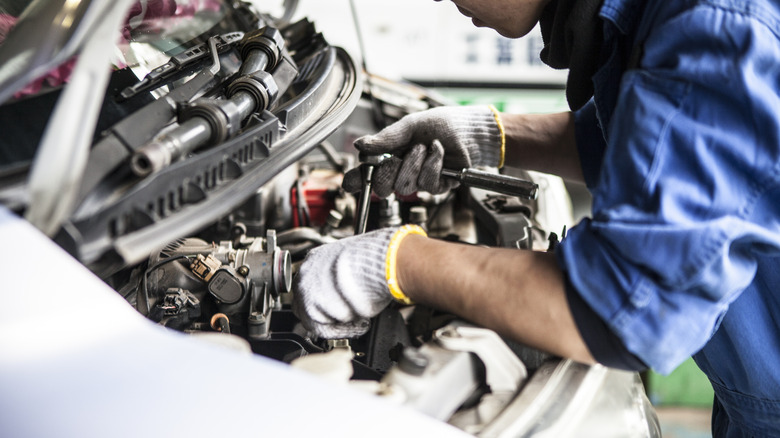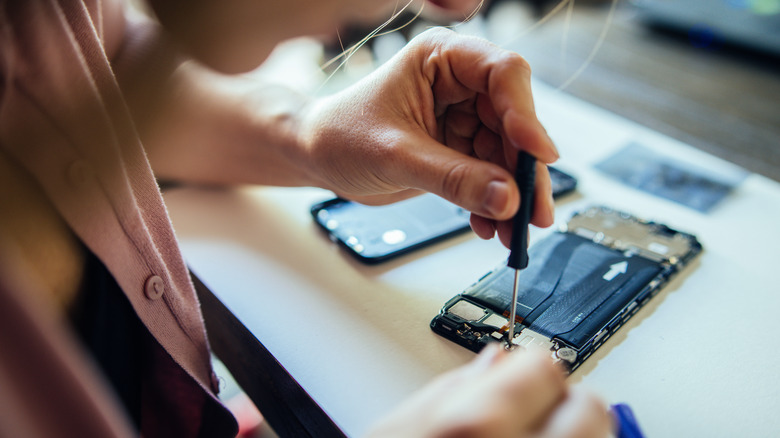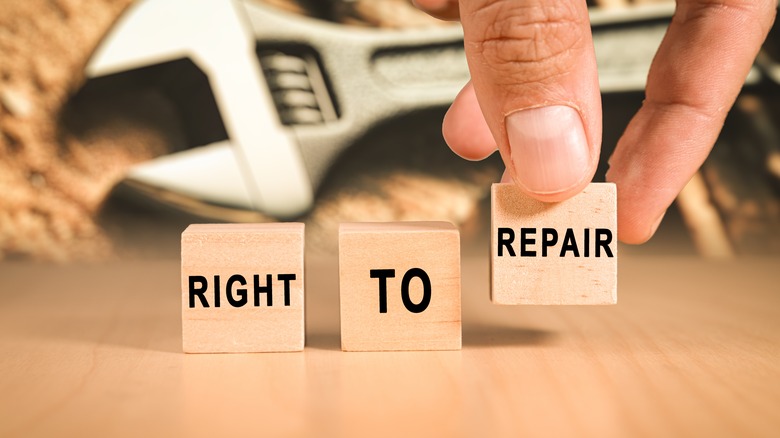Repair Monopolies Are The Hidden Money Drain You Need To Be Aware Of
As a consumer, you generally want the best products available at the price point you can afford. For big ticket items, chances are good you put in an extensive amount of research to compare things like features, availability, and even prices. However, one thing you might not know to research is the idea of proprietary parts or parts pairing. In fact, you might be surprised to learn that you, as the owner of a product, might not necessarily have the right to actually repair that item should it be damaged or broken thanks to repair monopolies.
The concept of parts pairing was actually first pioneered by Apple, who used proprietary screws in its products to ensure consumers couldn't actually open their own Apple products. This then necessitates that consumers bring their damaged or faulty products directly to Apple for repair, thereby ensuring significant annual revenues. More recently, you might have read about a lawsuit against Taylor Company (the company behind McDonald's infamously always-broken ice cream machines) which, in 2019, effectively eliminated a competitor's software that allowed McDonald's franchisees to more easily repair their ice cream machines. This is all thanks to a 1999 copyright law, which made it illegal for third-parties (including McDonald's employees) to access the manufacturer's code embedded in ice cream machines. It's worth mentioning that more than 25% of Taylor Company's revenues come from the necessary repairs on their ice cream machines. In this way it quite literally pays to have faulty machines.
How repair monopolies cost you
In addition to the fact you probably can't get an ice cream at McDonald's when you want to, repair monopolies and parts pairing can cost you as a consumer in other ways. For starters, owners of products from companies like Microsoft, Harley Davidson, and John Deere could face not only increased repair costs but also extended wait times for "authorized" dealerships or repair professionals to even look at their broken product. It's worth noting that farmers have repeatedly sued John Deere over their repair monopoly and in November 2023, a judge allowed a class action lawsuit against the farm equipment manufacturer to move forward.
While you might not find yourself personally buying a John Deere tractor or commercial ice cream machine anytime soon, a common place many consumers deal with repair monopolies and proprietary parts is with their car. Certain car brands use more proprietary parts than others, which can lead to significantly higher annual maintenance and repair costs (in addition to annual depreciation). Tesla, in particular, uses a high number of proprietary parts while also mandating that owners exclusively use company-approved service centers for repairs and maintenance. Other purchases that can be affected by repair monopolies include home appliances like fridges, washing machines, and even dishwashers. In fact, many appliance brands even bank on their proprietary parts as a secondary-market for revenues. Laptops and electronics can similarly face proprietary parts and repair requirements, such as Apple's infamous proprietary phone chargers (which were blissfully phased out in 2023).
What's next
There is good news on the horizon for consumers when it comes to repairing your own products. Something known as the right to repair movement has been making strides when it comes to reducing repair monopolies. As a refresher, the right to repair movement essentially advocates for legislation that would allow consumers and independent repair services to gain access to manufacturer's proprietary parts, tools, and service information. This then, in turn, allows consumers to fix their own devices without a manufacturer denying access or charging a premium through a repair monopoly.
In addition to the fact that, in 2021, Apple had to relent on its proprietary repairs and allow consumers to repair their iPhones themselves, there has also been a recent victory for McDonald's ice cream lovers. As of November 2024, a new exemption was put into place that counteracts the previous block on third-party repairs for proprietary equipment. More specifically, the exemption allows outside vendors to repair "retail-level commercial food preparation equipment."
According to the nonprofit Public Interest Research Group, in 2024, at least 30 states introduced or carried over Right to Repair legislation, which would allow consumers in those states to more easily repair their products. While some state legislation has failed, there is still pressure for federal legislation to better protect consumers. With any luck, repair monopolies will someday be a thing of the past and allow for more affordable repairs.


